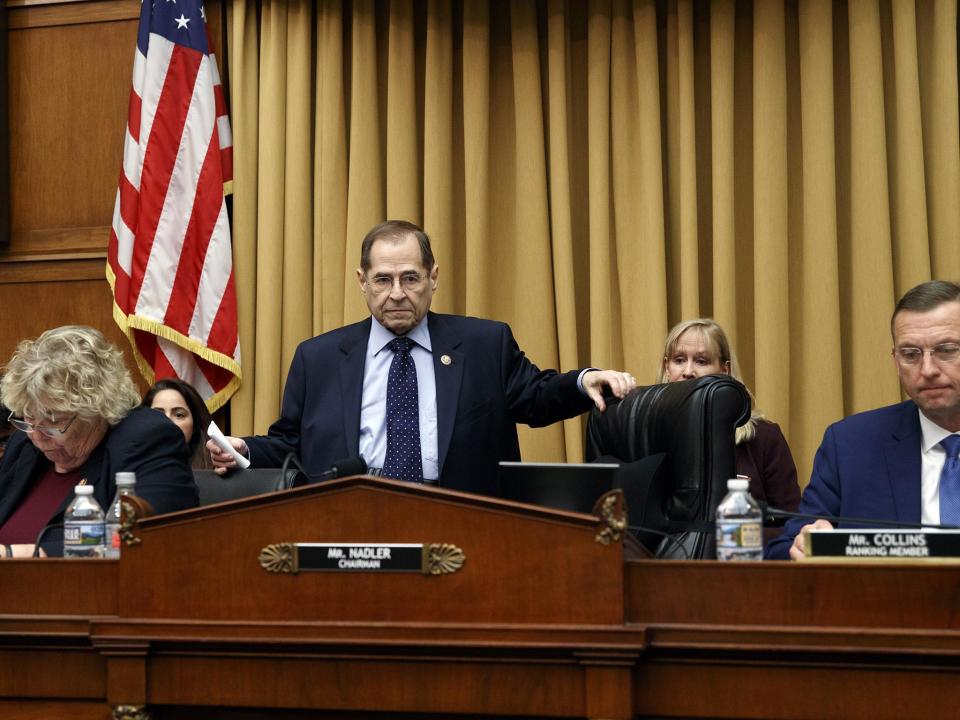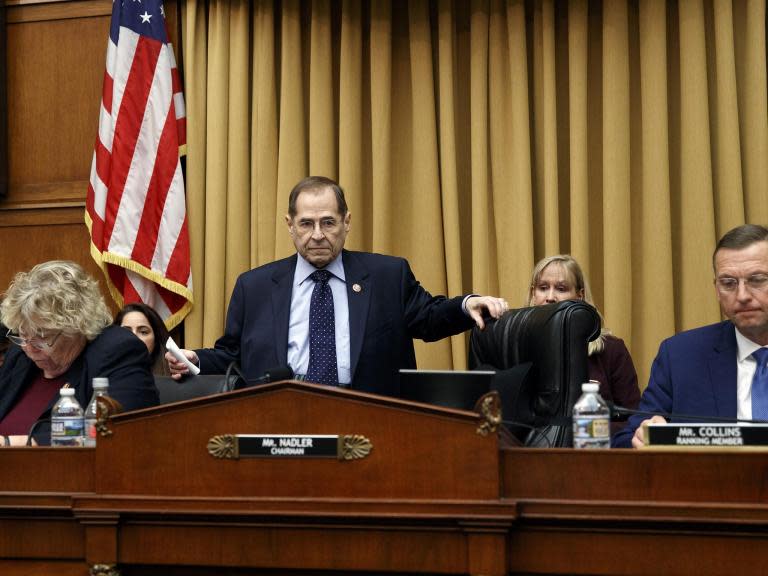Trump suggests he will not cooperate with investigation into obstruction of justice and abuse of power
President Donald Trump dismissed on Tuesday an expansive document request by House Democrats scrutinising whether he obstructed justice or abused power as nothing more than a political sideshow – and he suggested the White House might not co-operate.
Citing 81 document request letters dispatched on Monday to Trump associates by the House Judiciary Committee, the president called Democrats’ efforts “a disgrace to our country” and seemingly implied – incorrectly – that President Barack Obama refused to comply with Congress’ demands under similar circumstances.
“Essentially what they are saying is the campaign begins,” Trump told reporters Tuesday. “Instead of doing infrastructure, instead of doing health care, instead of doing so many things they should be doing, they want to play games.”
Mr Trump can instruct executive branch agencies to shield key evidence if he chooses. But it is unlikely that he alone can shake off the dragnet stretched across Trump world by Democrats, most systematically by the House Judiciary Committee this week.
Detailed requests were made by the panel’s chairman, Rep. Jerrold Nadler of New York, not just to the White House and key government agencies, but to private companies and individuals tied to Trump’s businesses, campaign and administration. More will follow.
Many of the people and entities have already told the Judiciary Committee they will co-operate, meaning that the panel could soon begin reaping reams of evidence already in the hands of special counsel Robert Mueller and federal prosecutors in New York. Others will most likely do so under subpoena in time.
A closer look at Nadler’s initial 81 targets – a mix of household names and bit players – reveals a web of lines of inquiry and overlapping interests. Here are some of the most noteworthy patterns.
Going Through the Front Door: The Government
The FBI, the Justice Department, the White House.
In a sign that House investigators are not waiting for Mueller or federal prosecutors in New York to finish their work, Nadler asked the FBI and the Justice Department on Monday to turn over vast tranches of information they have already collected in the case.
The terms were broad, asking for “all documents relating to” contacts between the Trump campaign and transition team and Russia, materials related to a June 2016 meeting with a Kremlin-connected lawyer promising dirt on Hillary Clinton, attempts by Trump to fire or otherwise retaliate against federal investigators, and potential emoluments by foreign or domestic governments to Trump entities, among nearly 30 other discrete topics.
The committee is not explicitly investigating Russia’s election interference or possible co-operation with the Trump campaign – that will be left to the House Intelligence Committee. But Nadler appears to want that information to understand what Trump might have been trying to obstruct and why he was using his office to assail the courts and the Justice Department.
A lengthy set of requests sent to the White House uses similar boilerplate language and asks for many of the same documents.
The Inner Circle and the Family
The Trump Organisation, the Trump Foundation, Donald Trump Jr., Eric Trump, Jared Kushner, Rhona Graff, Corey Lewandowski.
Trump famously surrounds himself with a small group of family members and trusted associates who often provide his closest counsel. Nadler wants to talk to many of them, and, naturally, the reasons are long and varied.
They include the president’s two adult sons, Donald Trump Jr. and Eric Trump, who were at Trump’s side when he made key business decisions during his campaign for office and during the transition into the White House. He also wants information from Jared Kushner, who is married to Trump’s eldest daughter, Ivanka Trump, and serves as a key White House adviser.
There are others, too, though. Rhona Graff, Trump’s longtime executive assistant, was asked for key material related to dealings with foreign entities by the Trump Organisation and the campaign, including the Trump Tower meeting. So was Corey Lewandowski, Trump’s former campaign manager and an informal adviser to his presidency.
And Nadler also took detailed requests directly to the Trump Organisation and the now-dissolved Trump Foundation.
The Fixers Who Tried to Protect the Campaign
Michael Cohen, David J. Pecker, American Media Inc., Donald Trump Jr., Donald J. Trump Revocable Trust, Allen Weisselberg, Ronald C. Lieberman, Matthew Calamari, Jared Kushner.
Nadler appears to be fishing widely for new information about hush money payments made during the 2016 campaign to bury the story of a pornographic film actress, Stormy Daniels, who claimed to have had an affair with Trump. Nadler has sent exhaustive demands to at least four figures already known to be central to the scheme, which federal prosecutors have said violated campaign finance laws.
Chief among them, of course, is Michael Cohen, Trump’s former personal lawyer and longtime fixer, who arranged the payments and testified publicly last week before another House committee that Trump was a full participant in the effort. From Cohen, the committee wants all documents “relating to any payment, or discussions regarding any actual or potential payment” for the benefit of Trump or the campaign.
The committee is seeking similar evidence from American Media Inc., the publisher of The National Enquirer, and its chairman, David J. Pecker, who worked with Cohen to buy Daniels’ silence in the waning weeks of the 2016 campaign.
Allen Weisselberg, the chief financial officer of the Trump Organisation who Cohen testified helped craft the illegal hush money scheme, was asked the same question, among a range of others about potential business dealings with Russia or other foreign powers.
Potential Witnesses to Presidential Obstruction
Don McGahn, Annie Donaldson, Hope Hicks, Sean Spicer, Jeff Sessions, Corey Lewandowski, Jay Sekulow, Thomas P. Bossert, Michael Cohen, Rick Gates, Paul Manafort, Michael Flynn, Steve Bannon, Reince Priebus.
Potential obstruction of justice by Trump is of paramount importance to the Judiciary Committee, which twice in the past half-century has included obstruction in articles of impeachment against a president.
Dozens of witnesses were asked about Trump’s reported attempts to attack or impede the investigation, but a half-dozen or so individuals are clearly people of interest. Chief among them is Don McGahn, Trump’s former White House counsel, who was at the president’s side during many of the episodes central to the Democratic argument that Trump tried to obstruct justice.
The committee asked McGahn for documents related to the firing of James Comey as FBI director; discussions about the recusal of Jeff Sessions, then the attorney general, from overseeing the Russia inquiry; and any attempts to fire Sessions, Mueller and Rod Rosenstein, the deputy attorney general overseeing the special counsel inquiry.
Nadler also asked McGahn for documents related to possible pardon offers for Paul Manafort, Trump’s former campaign chairman; Michael Flynn, Trump’s first national security adviser; and Cohen. He also asked for paperwork about public statements made about various interactions between Trump associates and Russia.
Nadler sent similar questions to Annie Donaldson, McGahn’s deputy, who took exhaustive notes detailing Trump’s behaviour in the West Wing in real time; Hope Hicks, a former White House communications director; Sean Spicer, the first Trump White House press secretary; Sessions; and Lewandowski.
There were other topics, too. Nadler asked Jay Sekulow, a lawyer for Trump, for any drafts of a statement delivered by Cohen last year to the House and Senate intelligence committees about a Trump Tower project in Moscow. Cohen testified last week that Sekulow had been involved in preparing his testimony, which proved to be false and led Cohen to plead guilty to lying to Congress.
The Foreigners and the Web They Might Have Influenced
Andrew Intrater, Erik Prince, Michael Flynn, Irakly Kaveladze, Thomas J. Barrack Jr., Tony Fabrizio, Viktor Vekselberg, Paul Erickson, George Nader, the Trump Inaugural Committee, the NRA, Matthew Calamari, Alan Garten, Ronald C. Lieberman.
Nadler said publicly on Monday that his committee was keenly interested in the possibility of pay-to-play style corruption and possible violations of the Constitution’s emoluments clause, which bans public officials from receiving gifts from foreign governments. Trump’s businesses and his inaugural committee received document requests, and both appear to be at the centre of this inquiry.
The committee sent other requests to Viktor Vekselberg, a Russian oligarch who attended the inaugural festivities, and Andrew Intrater, whose firm hired Cohen on a $1 million consulting contract to help navigate Trump’s Washington. Thomas J. Barrack Jr., the chairman of the inaugural committee and another informal adviser to the president, was asked about contacts and possible financial support offered by foreign governments, including Middle East powers. Erik Prince, a private security contractor who arranged a 2016 meeting between Donald Trump Jr. and an emissary for two wealthy Arab princes, received a letter, as did the emissary, George Nader.
Nadler queried Trump Organization executives – including Weisselberg, Matthew Calamari, Alan Garten and Ronald C. Lieberman – for documents related to any foreign or domestic government “discussing, offering, or providing, or being solicited to discuss, offer, or provide, any present or emolument of any kind” to Trump, his businesses, Kushner, his businesses and the inaugural committee.
The committee requested similar information from the General Services Administration, which leases the Old Post Office building in downtown Washington to the Trump International Hotel.
Julian Assange and the WikiLeaks Crowd
WikiLeaks, Julian Assange, Roger J. Stone Jr., Jerome Corsi, Randy Credico, Sam Nunberg, Ted Malloch.
WikiLeaks’ release of Democratic emails during the 2016 campaign does not appear to be of immediate concern to Nadler. Nor is it clear he will get voluntary cooperation.
But Nadler has taken direct aim at the organisation and its associates, anyway. He has requested from WikiLeaks itself and from its founder, Julian Assange, records of any communications with Trump’s campaign or associates and whether Assange has knowledge of communications between Trump associates and Russia.
Nadler asked Roger Stone, a longtime Trump adviser who prosecutors said was dispatched by the campaign to get information from WikiLeaks, about his contacts with both.
Cambridge Analytica and Claims of Voter Manipulation
Cambridge Analytica, the SCL Group, Alexander Nix, Brittany Kaiser, Julian D. Wheatland.
Cambridge Analytica, the now-defunct political data firm that worked for the Trump campaign during the 2016 presidential election, is also on the Judiciary Committee’s list. Along with Cambridge itself, the committee wants documents and emails from its parent company, the SCL Group, along with four of the firm’s former employees: Alexander Nix, its former chief executive; Brittany Kaiser, a former employee who has sought to cast herself as a whistle-blower since the firm imploded; and Julian D. Wheatland, the chairman of the SCL Group.
The focus on Cambridge Analytica is not entirely clear. The political data firm last year became embroiled in a data-harvesting scandal after The New York Times and The Observer of London exposed how it harvested personal information from the Facebook profiles of up to 87 million people.
The firm used the data to help build its so-called psychographic modelling techniques, which underpinned its work for the Trump campaign. Nix once called the practice “our secret sauce,” though some have questioned its effectiveness.
The New York Times


